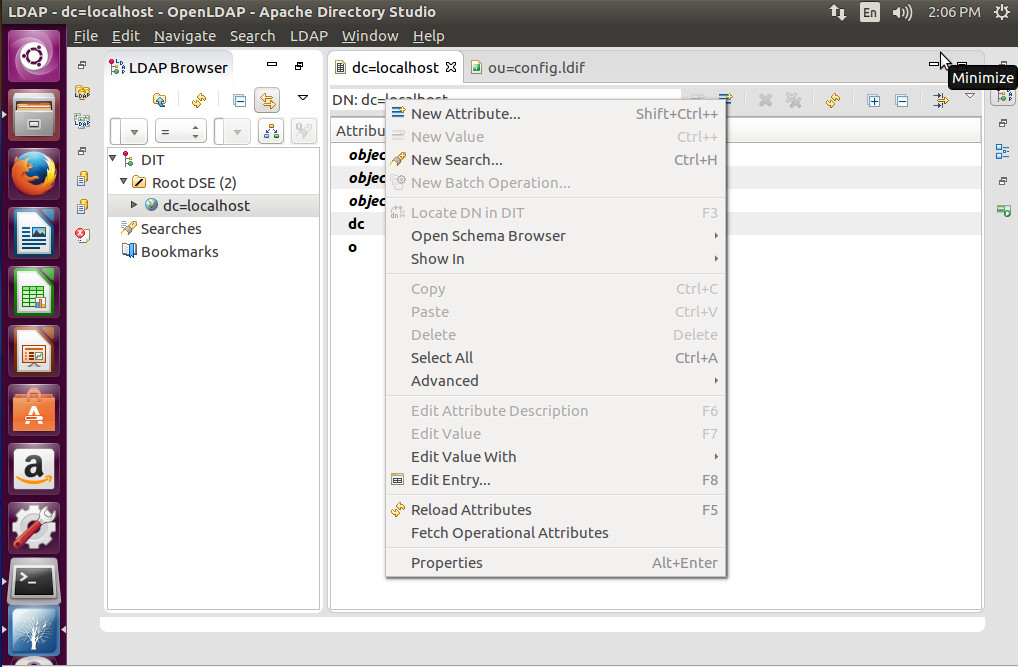
- #APACHE DIRECTORY STUDIO LOG4J VULNERABILITY UPGRADE#
- #APACHE DIRECTORY STUDIO LOG4J VULNERABILITY CODE#
Log4Shell: RCE 0-day exploit found in log4j2, a popular Java logging package Please refer to individual CVE pages for more details. This flaw may be avoided by using other available means to access log entries. Chainsaw is a standalone graphical user interface for viewing log entries in log4j.
#APACHE DIRECTORY STUDIO LOG4J VULNERABILITY CODE#
A flaw was found in the log4j v1.x chainsaw component, where the contents of certain log entries are deserialized and possibly permit code execution. Note this issue only affects Log4j v1.x when specifically configured to use the JDBCAppender, which is not the default.ĬVE-2022-23307 (Log4j v1.x Chainsaw) has a severity impact rating of Important.

JDBCAppender in Log4j v1.x is vulnerable to SQL injection in untrusted data. This flaw ONLY affects applications that are specifically configured to use JMSSink, which is not the default, or when the attacker has write access to the Log4j configuration for adding JMSSink to the attacker's JNDI LDAP endpoint.ĬVE-2022-23305 (Log4j v1.x JDBCAppender) has a severity impact rating of Important. Log4j v1.x is vulnerable to deserialization of untrusted data. Log4j v1.2 is vulnerable to deserialization of untrusted data when either the attacker has write access to the Log4j configuration or is configured to use JMSAppender with specific options enabled, which is not the default configuration.ĬVE-2022-23302 (Log4j v1.x JMSSink) has a severity impact rating of Moderate.

For Log4j v1.x, there are separate known issues depending on the affected libraries or components as mentioned below, and most of them are NOT affected when used with the default configuration.ĬVE-2021-4104 (Log4j v1.x JMSAppender) has a severity impact rating of Moderate. Do the updates mentioned in this Security Bulletin fix the vulnerabilities in Log4j v1 as well?Ī: Log4j version 1.x is NOT affected by CVE-2021-44228 (Log4Shell). Set the system property log4j2.formatMsgNoLookups or the environment variable LOG4J_FORMAT_MSG_NO_LOOKUPS to trueįor Log4j versions between 2.7 and 2.14.1:Īll PatternLayout patterns can be modified to specify the message converter as %m) in your product's Log4J configuration (which is not configured by default and out-of-box in Red Hat Products), you are not vulnerable to these issues. Refer to CVE-2021-44228 for more details. A remote attacker who can control log messages or log message parameters can execute arbitrary code on the server via the JNDI LDAP endpoint. Red Hat Ansible Automation Platform (Engine and Tower)Ī flaw was found in the Java logging library Apache Log4j in versions from 2.0.0 and before 2.15.0. Red Hat Advanced Cluster Security for Kubernetes Red Hat Advanced Cluster Management for Kubernetes The following products are NOT affected by this flaw and have been explicitly listed here for the benefit of our customers. This issue has been assigned CVE-2021-44228 and rated with a severity impact of Critical. This flaw allows a remote attacker to execute code on the target system with the same privileges as the Java-based application that invoked Apache Log4j v2.

#APACHE DIRECTORY STUDIO LOG4J VULNERABILITY UPGRADE#
Apache Log4j is a library for logging functionality in Java-based applications.Ī flaw was found in Apache Log4j v2 (an upgrade to Log4j), allowing a remote attacker to execute code on the server if the system logs an attacker-controlled string value with the attacker's Java Naming and Directory Interface™ (JNDI) Lightweight Directory Access Protocol (LDAP) server lookup.


 0 kommentar(er)
0 kommentar(er)
